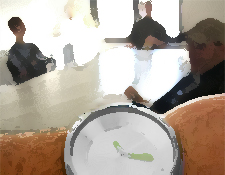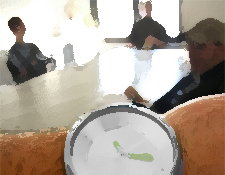
 We’ve all been there. The afternoon meeting where your eyelids suddenly start to feel heavy. Maybe lunch was a little too good, maybe the speakers’ voices are a little dreary, but before you know it, all you can think about is closing them. Just for a second…
We’ve all been there. The afternoon meeting where your eyelids suddenly start to feel heavy. Maybe lunch was a little too good, maybe the speakers’ voices are a little dreary, but before you know it, all you can think about is closing them. Just for a second…
Perhaps things don’t get quite that bad. Perhaps you simply find yourself losing concentration and failing to keep up with what is being said. If that’s the case, you’re not making the most out of this vital workplace environment. Modern businesses move swiftly, and a loss of focus for even a couple of minutes could mean loss of crucial information.
So how best to stay focused, relaxed and attentive? Here’s five useful tips:
A Clear Agenda
Nothing is less mentally appealing than a long, poorly focussed meeting. Your brain simply gives up listening. Keep control of the direction and pace with a clearly written agenda. Make sure it is distributed before the day and that it succinctly introduces all the topics for discussion. A good tip is to include the start and finish time in a clear, bold heading at the top. This will make sure that everyone is aware of time constraints.
Timing
A meeting after lunch is never a good idea. After meals we experience a ‘postprandial dip’ – a drop in our sugar levels and body temperature. By contrast, we are at our most attentive around two hours after waking. Schedule your meetings early in the day to reduce any chance of a suffering from a dip in attentiveness.
What to Take?
One of the most common displays of inattentiveness is fidgeting. Few things make a worse impression on a speaker than someone searching loudly through a bag, playing with jewellery or doodling. Here’s what you need with you; something to write with, and something to write on. That’s all. Leave your bag, coat, wallet and valuables somewhere safe where your mind won’t be on them. Oh, and always turn off that mobile!
Environment
Just as important as the time of day, is the space that your meeting is being held in. If you’re able to, ensure that you select a well-ventilated, bright, naturally-lit room, with a comfortable ambient temperature.
Hydration
One of the effects of dehydration can be drowsiness, or a reduction in attentiveness. If you notice your concentration drifting, two great ways to combat that feeling are to either drink something or to communicate actively with someone else. Combine the two. If there’s a jug of water in the room, reach for it, and pour yourself a glass, but before doing so, quietly offer others the same. You’ve made yourself alert to their response, brought yourself back to the room, and in so doing, got yourself a refreshing drink.
Hopefully, with these tips, you’ll find you feel brighter, sharper and more focused at your next meeting.
Leave a Reply